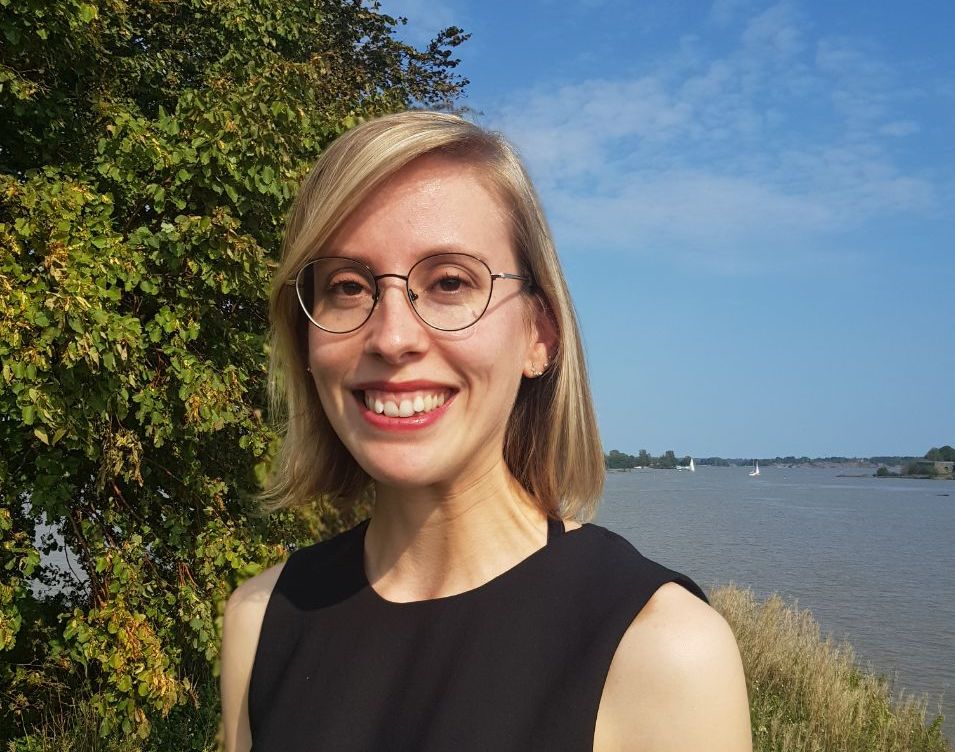Audrey Poudrier Tremblay, KONE: “The hardest part is to get the first job”
From trainee to thesis worker to full-time Operational Planning Manager, Canadian-born Audrey Poudrier Tremblay shares her job-hunting experiences. According to Poudrier Tremblay, networking and connections can make a difference for an international student looking for work. The interview is part of our #STAYinFinland campaign, and it was made by our American summer intern, Anna Bogdan.
Audrey Poudrier Tremblay currently works as an Operational Planning Manager at KONE, after a five-year history of traineeships, thesis work, and promotions at the company. She attributes this to her strong work at KONE and doing her best to make connections.
“The hardest part is to get the first job”
Having first interacted with KONE as a potential employer as an exchange student at Aalto University, and with a desire to experience Finland outside the exchange student bubble, Poudrier Tremblay joined KONE’s International Trainee Program in 2016.
After finishing her Bachelor’s in Industrial Engineering in Canada and continuing to work at KONE, Poudrier Tremblay began her Master’s in Industrial Engineering and Management with a focus on Organizational Design and Leadership at Aalto University.
The program’s strong student guild encouraged networking and meeting companies. However, Poudrier Tremblay identified a key problem faced by many international students: while these events are held in English to be inclusive, “often times one would go to one of these events, start discussing job opportunities, and would be told, ‘well, if you can’t speak Finnish, there are no job opportunities for you here’.”
With limited job opportunities due to language barriers, and strong competition for few positions, networks and connections can make a difference for an international student looking for work.
“As foreigners, we start with a lot of mileage behind Finnish people because we don’t have these networks, so when you have the occasion to get a foot in one place, you really have to leverage this.”
One of the ways Poudrier Tremblay did this at KONE was by joining the KONE Young Professionals Club to meet colleagues.
Partnering with a company can help some students find thesis topics
Networking helped Poudrier Tremblay, who knew she wanted to write a thesis in collaboration with a company, to find someone at KONE willing to work with her.
“I really wanted this approach because not only did it give me experience with a strategically important project for KONE, but also it made the experience a lot more practical.”
Poudrier Tremblay thinks thesis partnerships with companies are a great option for students who want to take a more practical approach and make connections with a company.
When asked whether thesis work could present one way for international students interested in such an approach to connect with companies, Poudrier Tremblay raised an important caveat, “I would think about the long-run as well. If there are further opportunities for that person in the company [afterwards], then definitely.”
For any student, such work should be a partnership. If the thesis worker is isolated, such as through language barriers, and has no opportunities with or through the company then the benefits of such a partnership are limited, says Poudrier Tremblay.
“If you’ve been hired there, you belong just as much as the Finn next to you.”
Having grown into her current position at KONE, Poudrier Tremblay recognizes the importance of KONE’s International Trainee Program for providing an integrated way to start in a company where growth within the company is possible.
As for her work at KONE, working in Finland has also introduced Poudrier Tremblay to some Finnish ways of working, one being 11am lunches. “I’ve become an advocate for it. It makes sense, especially if you wake up early in the morning!”
Another element Poudrier Tremblay noticed was the trust her colleagues put in her from day one. This trust offers the ability to set clear expectations, she says, and being transparent from day one can help international employees avoid disappointment that may be caused by cultural misunderstandings or differences. Being able to speak freely–for example, to ask colleagues to switch to into a language you understand–empowers yourself and improves the whole workplace.
“Be proud of being an international. We bring talent, a fresh pair of eyes, and new perspectives, so any company is lucky to have such talents inside to contribute to their businesses,” she says to international employees.
Poudrier Tremblay’s advice for international jobhunters and new employees:
- Message contacts on job postings for clarification about language requirements: Having done this herself, Poudrier Tremblay noticed that sometimes fluency in Finnish language is not actually mandatory, despite what the post says. Asking whether Finnish language knowledge is mandatory and whether you are encouraged to apply regardless can help you decide where to apply.
- When beginning a new job, set your expectations and be open about your thoughts and experiences.
Poudrier Tremblay’s recommendations for companies:
- Carefully consider what language knowledge is actually required for the open position and communicate mandatory language levels clearly in job postings.
- Provide inclusivity training for employees to help address habits that may make someone feel left out.
The interview was made by EK’s American intern Anna Bogdan.
